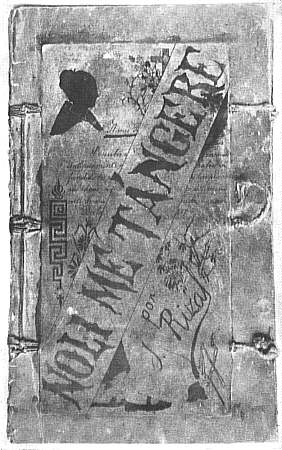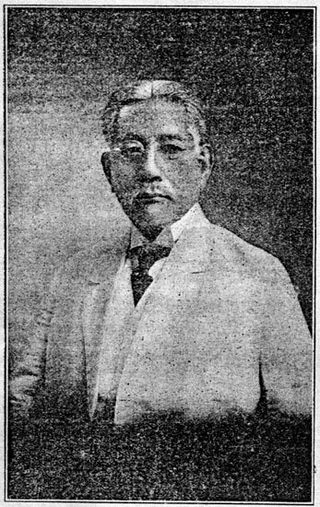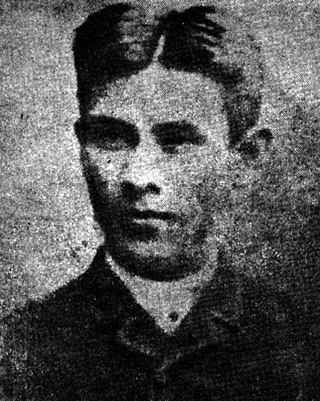Padre Dámaso Verdolagas is a fictional character in the novel Noli Me Tángere. The novel was written by José Rizal, one of the leaders of the Propaganda Movement in the Philippines. Noli Me Tángere is a controversial and anticlerical novel that exposed the abuses committed by the Spanish friars and the Spanish elite in colonial Philippines during the 19th century.

Noli Me Tángere is a novel by Filipino writer and activist José Rizal published during the Spanish colonial period of the Philippines. It explores perceived inequities in law and practice in terms of the treatment by the ruling government and the Spanish Catholic friars of the resident peoples in the late nineteenth century.

Noli me tangere is the Latin version of a phrase spoken, according to John 20:17, by Jesus to Mary Magdalene when she recognized him after his resurrection. The biblical scene has been portrayed in numerous works of Christian art from Late Antiquity to the present. The phrase has also been used in literature, and later in a variation by military units since the late 18th century.
María Odulio de Guzmán was a Filipino teacher, educator, principal, writer, and author.

Delfina Rizal Herbosa de Natividad was a Filipino renowned for being one of the three women, together with Marcela Agoncillo and her daughter Lorenza, who seamed together the Philippine flag, and for being the niece of the National Hero of the Philippines, José Rizal.

José Protasio Rizal Mercado y Alonso Realonda was a Filipino nationalist, writer and polymath active at the end of the Spanish colonial period of the Philippines. He is considered the national hero of the Philippines. An ophthalmologist by profession, Rizal became a writer and a key member of the Filipino Propaganda Movement, which advocated political reforms for the colony under Spain.

Saturnina Rizal Mercado de Hidalgo, or simply Saturnina Hidalgo, was the eldest sister of Philippine national hero José Rizal. She was married to Manuel T. Hidalgo, a native and one of the richest persons in Tanauan, Batangas. She was known as Neneng.
Basilio is a name of Italian, Spanish, or Portuguese origin. It is a cognate of the English name Basil. The name may refer to:

María Clara, whose full name is María Clara de los Santos y Alba, is the mestiza heroine in Noli Me Tángere, a novel by José Rizal, the national hero of the Philippines. Her name and character have since become a byword in Filipino culture for the traditional, feminine ideal.

Leonor Rivera-Kipping was the childhood sweetheart, and “lover by correspondence” of Philippine national hero José Rizal. Rivera was the “greatest influence” in preventing Rizal from falling in love with other women while Rizal was traveling outside the Philippines. Rivera's romantic relationship with Rizal lasted for eight years. She was immortalized by Rizal as the character María Clara in the Spanish-language novel Noli Me Tangere. Her original hometown is in Camiling, Tarlac.

Pascual H. Poblete was a Filipino writer, journalist, and linguist, remarkably noted as the first translator of Dr. José Rizal's novel Noli Me Tangere into the Tagalog language.
The 11th FAMAS Awards Night was presented by the Filipino Academy of Movie Arts and Sciences on April 14, 1963 honoring the outstanding achievements of Filipino films for the year 1962.

Máximo Viola y Sison was a propagandist, writer, revolutionary leader and doctor from Bulacan, Philippines.
Crisostomo or Crisóstomo is a given name and a surname. Notable people with the name include:

Noli Me Tangere is an opera in 3 acts by Felipe Padilla de León with libretto by Guillermo Tolentino. The opera was closely based on a novel by José Rizal by the same name. The opera was sung entirely in Tagalog and is considered as the first full-length Filipino opera.

El Filibusterismo (Subversion) is an opera in 3 acts by Felipe Padilla de León with libretto by Anthony Morli. The opera was closely based on a novel by José Rizal by the same name. It is the sequel to Noli me Tangere, another novel by Rizal which was also adapted as an opera by the same composer.
Noli Me Tángere is a 1961 Philippine period drama film co-written and directed by Gerardo de León. Based on the 1887 novel of the same name by José Rizal, it stars Eduardo del Mar, Edita Vital, Johnny Monteiro, Oscar Keesee, Teody Belarmino, and Leopoldo Salcedo. The film was released on June 16, 1961, timed with the centenary of Rizal's birth.
El filibusterismo is a 1962 Philippine period drama film co-written and directed by Gerardo de León. Based on the 1891 novel of the same name by José Rizal, it is a sequel to the 1961 film Noli Me Tángere, and stars Pancho Magalona, Charito Solis, Teody Belarmino, Edita Vital, Ben Perez, Carlos Padilla Jr., Lourdes Medel, Robert Arevalo, and Oscar Keesee. The film was released on March 30, 1962.
Noli Me Tángere, also known as Noli Me Tángere: The Musical, is a Filipino musical based on José Rizal's novel of the same name, with music by Ryan Cayabyab and libretto by Bienvenido Lumbera. Directed by Nonon Padilla, the musical premiered in 1995 at the Cultural Center of the Philippines (CCP) in Manila.









